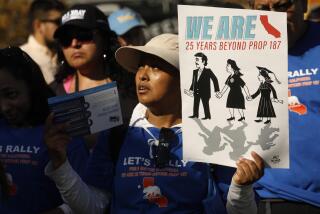The Changing Face of Illegal Immigration Is a Child’s
To the extent that there is room for another immigration story in this month of immigration stories, consider the tale of Sou-Feng Chen. It hasn’t made headlines--she didn’t perish at sea like Elian Gonzalez’s mother, or stow away in a tomblike cargo container. But it does have some interesting angles. It begins in Los Angeles with a routine arrest.
The arrest is at LAX, where Chen has arrived without papers--a method of entry that, among undocumented Chinese nationals here, is also routine. With her are her sons, who also lack documentation. The boys are 12 and 14. The family is here to reunite with the boys’ father, who has found his way to New York and has sent for his wife and children. When the authorities question her, she apparently expresses the routine “credible fear” of retaliation in China that allows people from that nation to stay and apply for political asylum. This, too, is routine.
The mother is sent to Terminal Island in San Pedro, pending a decision on her asylum. The boys are sent to a special lockup for kids in U.S. Immigration and Naturalization custody at Los Padrinos juvenile hall. And, as is routine, because visits are prohibited between people in separate detention, the woman cannot see her children, though they are only half an hour down the freeway. After days of weeping, she suffers an epileptic seizure and spends two weeks in the hospital.
*
There are some for whom the upshot of a story like this would be: So what? What’s illegal is illegal is illegal, as the Prop. 187 chant used to go. Foreigners who try to smuggle themselves and their kids past the U.S. border should get trauma, and plenty of it. There was a time, just half a dozen years ago, when holders of such opinions could pass whole statewide ballot measures in California.
But times change. And so has the public face of immigration, as this month’s barrage of stories, from the shores of Miami to the Port of Los Angeles, indicate.
“More families, more minors,” one INS spokeswoman summed it up--a trend human rights advocates chalk up to “more globalization.” The impoverished and desperate arrive, settle and send for spouses and children. The INS took about 4,500 unaccompanied minors--4,500 Elian Gonzalezes--into custody last fiscal year, along with so many asylum seeking families like Sou-Feng Chen’s that, this spring, the agency is expected to open a first-ever families-only detention center in a converted nursing home near Reading, Pa.
The number of children taken into INS custody from China alone has nearly tripled nationally since 1997, to 648, and they typically arrive with such a massive debt to their smugglers--the going rate is now $60,000--that the agency has to hold them for weeks just to keep them safe. In 1995, a gang of enforcers abducted three Chinese teenagers who’d been placed by the INS in foster homes near Seattle pending their claims for asylum. By the time agents found them--bound, gagged and stripped to their underwear--in a locked house in a suburb, the girl had been raped and the two boys had been tortured. One of the kidnappers later told the court that he’d been smuggled in the year before, when he was himself a minor. He’d become an enforcer to pay off his debt.
In Southern California, the separation of mothers and children in detention pending asylum claims has become an ongoing source of vexation, says Leonard Kovensky, INS assistant director for detention and deportation. “Nobody likes it,” he says. “It’s traumatic for everyone.” The solution would be a family facility for Southern California like the one planned for May in Pennsylvania, he says, “but you have to find people willing to do it and a neighborhood willing to accept it.” Moreover, the social service and local government agencies with whom the INS would presumably contract for beds want a guaranteed occupancy level, and the INS can’t supply one.
So when a mother comes in with children under 10 and can’t be immediately deported, Kovensky says, the INS now rents a hotel room for them and sends a detention officer out to stand guard full time. If the kids are older, it’s a Sou-Feng Chen story, with taxpayers shelling out $110 a night for the kids to stay in juvenile hall.
It’s labor-intensive and expensive--the sort of cost likely to turn up as an argument for the new incarnation of Proposition 187, a plan to effectively write the denial of public services for illegal immigrants into the state Constitution, which is currently circulating in statewide petition drives. Of course, when 187 passed, its supporters may not have been picturing sobbing mothers or a raped adolescent or a little boy in an inner tube in the ocean. Could be a different story, this time.
*
Shawn Hubler’s column appears Mondays and Thursdays. Her e-mail address is [email protected].
More to Read
Sign up for Essential California
The most important California stories and recommendations in your inbox every morning.
You may occasionally receive promotional content from the Los Angeles Times.










